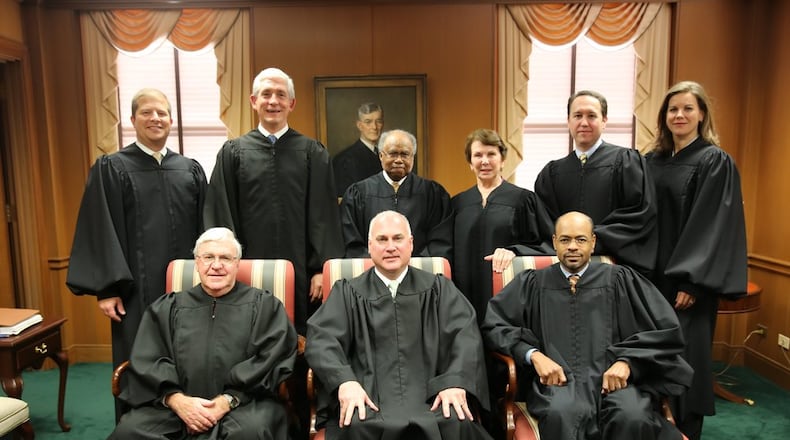There’s a malady that affects some in the judiciary, often called “robe-itis.” It’s an affliction that plagues some judges after years on the bench. Having the power to take away people’s freedom and having lawyers routinely groveling before you can do that.
After a while, you start believing the dogma of your infallibility.
Meet Superior Court Judge Eric Norris of Athens, the latest in the annals of judges in Georgia behaving badly.
Two years ago, Norris was enraged by a young bail bondsman who had the temerity to publicly criticize him on social media. So Norris did what any aggrieved, robe-wearing megalomaniac might do: He summoned the fellow to his office, had an armed officer stand near the door so the man believed he was not free to leave and then the red-faced, lip-quivering judge let him have it for 30 minutes.
During his judicial diatribe, Norris belittled the education of the bondsman, Nathan Owens, who was merely a high school grad, and then read him the state code that sets out the qualifications of bondsmen. The judge let Owens know his word’s “carry weight” in the tight-knit legal community and strongly implied the man’s career might be toast.
The Judicial Qualifications Commission (JQC), the state agency set up to go after problematic judges, heard the the case, found what I just described did, in fact, happen. Then it meted out the punishment: Judge Norris must publicly apologize to the guy. That’s it. No suspension, no public reprimand, no censure.
If you or I held a person in a room against his will and then screamed at them and made threats as an armed person loomed by the door, it would be considered real bad, like perhaps even a felony called false imprisonment.
If a judge does it, the remedy simply becomes a matter of telling him to say, “Oh gee, I’m sorry.”
It reminds me of what my mom made me do when I talked back to a neighbor. I was 6.
The recommended “sentence” is not final, as the case will go to the Georgia Supreme Court for final dispensation. The justices could order something more severe — perhaps like putting a letter in his permanent file! But that remains to be seen.
The JQC was created decades ago to review the bad actions of judges and mete out deserving punishment. In the decade between 2007 and 2016, it removed 66 wayward judges in the state.
But in 2016, the state legislature, led by a state rep who had been chased from the bench by that same commission, moved to defang the agency. The reason? The watchdog agency was actually doing its job. Now, it’s more like the Judicial Protection Commission.
Norris’ case was heard by a three-person panel, Fulton County Superior Court Judge Robert McBurney, Rabun County educator Maggie Rickman and Atlanta lawyer Jamala McFadden. The panel determined Norris’ misconduct was “too serious . . . to be simply brushed aside” — and then voted 2-1 to brush it aside.
The panel said an apology by Norris, read by him in open court, would be more “restorative.” It’s uncertain if Owens would be want to be in the same room with Judge Blow-his-Stack.
McFadden dissented, saying an apology is simply not enough, that Norris should be called before the Supreme Court and be read a reprimand by the justices in open court. And perhaps they could raise their eyebrows and glance harshly at him while doing it.
Credit: Courtesy of Nathan Owens
Credit: Courtesy of Nathan Owens
Now, a fan of the Judicial Protection Commission might call me after this opinion column runs and point out the chief magistrate of Crawford County recently got a 30-day suspension and will be reprimanded in open court. True, but in that case, Chief Magistrate Cary Hays III slammed a shackled inmate against the wall in a courthouse hallway after the prisoner cussed him.
Slamming someone against a wall is bad, but here is something else to consider: Hays is a magistrate judge and you don’t need a law degree for the job. All you need to qualify is a high school diploma and be at least 25 years old. And Hays (and believe me, I’m not arguing for body slamming here) lost his cool and acted right away.
But Norris had five days to chill out between reading the bail bondsman’s offending Facebook post (it was about releasing a defendant charged with rape on his own recognizance) and ordering him into his office. The JQC panel noted this, saying Judge Norris employed “careful, conscious planning” in his misdeed, which made it “all the more remarkable — and problematic.”
I called Norris’ office and have not heard from him. His written response to the JQC said he had “good intentions” when summoning Owens to his office but took “the wrong steps in trying to remedy (his) concerns.” Norris noted that the situation was “tense and awkward” (imagine how awkward it was for the bail bondsman!). Also, he “regrets” his actions.
The judge was cross-examined before the JQC hearing panel, which found “his testimony inconsistent and contradicted by other evidence.” I think the legal term is “misremembering” facts.
Perhaps the Supreme Court might consider that before raising a collective eyebrow of disapproval.
About the Author
Keep Reading
The Latest
Featured




